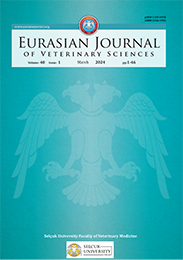| 2012, Cilt 28, Sayı 4, Sayfa(lar) 209-213 | |
| [ Özet ] [ PDF ] [ Benzer Makaleler ] [ Yazara E-Posta ] [ Editöre E-Posta ] | |
| Superoxide dismutase and antioxidant status of hens' granulosa cells exposed to lead and molybdenum | |
| Marcela Capcarova1, Adriana Kolesarova1, Alexander V. Sirotkin2 | |
| 1Department of Animal Physiology, Faculty of Biotechnology and Food Sciences, Slovak University of Agriculture in Nitra, Tr A. Hlinku 2Department of Genetics and Reproduction, Animal Production Research Centre Nitra, Hlohovecka, Nitra, Slovak Republic |
|
| Keywords: Granulosa cells, lead, molybdenum, SOD, total antioxidant status | |
| Abstract | |
Aim: The aim of this study was to determine the activity of
superoxide dismutase (SOD) and total antioxidant status
(TAS) of ovarian granulosa cells of hens cultured in vitro after
lead (Pb) and molybdenum (Mo) administrations. Material and Methods: Ovarian granulosa cells were incubated with lead acetate/ammonium molybdate administrations as follows: group A (0.09/0.09 mg/mL), group B (0.13/0.13 mg/mL), group C (0.17/0.17 mg/mL), group D (0.33/0.33 mg/mL), group E (0.5/0.5 mg/mL) and the control group without any additions for 18 h. Results: Antioxidant status of granulosa cells was dependent on Pb and Mo doses. Higher doses of both metals caused significant reduction of SOD activity. TAS of cells was decreased in experimental groups. Conclusion: Trace elements can adversely affect animal reproductive system and its functions, through either direct or indirect effects on oxidative stress induction. |
|
| [ Başa Dön ] [ Özet ] [ PDF ] [ Benzer Makaleler ] [ Yazara E-Posta ] [ Editöre E-Posta ] | |




